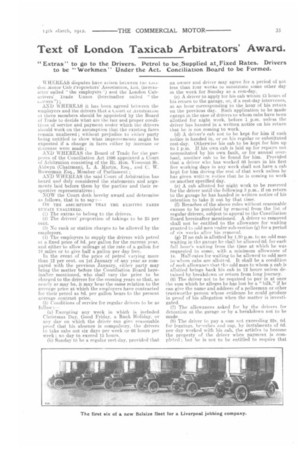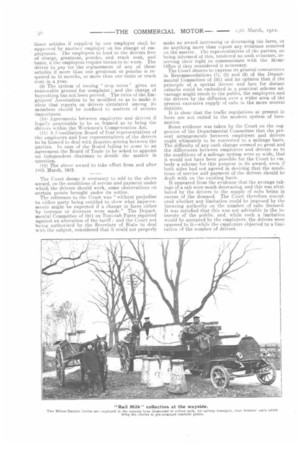Text of London Taxicab Arbitrators' Award.
Page 15

Page 16

If you've noticed an error in this article please click here to report it so we can fix it.
"Extras" to go to the Drivers. Petrol to be.Supplied at Fixed Rates. Drivers to be " Workmen' Under the Act. Conciliation Board to be Formed.
'WHEREAS disputes have arisen between tile tamdon atotor Cab froprietorsl Association, iva. (hereinam): called " the employers ") and the London Caburivers' Trade Union (hereinafter called " the i. ivers ") ; ANT) WHEREAS it has been agreed between the employers and the drivers that a Loan CI Amara-um' or three members should be appointed by the Board of Trade to decide what are the ta,ir and proper conditions of service and payment under which the drivers should work on the assumption that the existing fares remain unaltered; without prejudice to either party being entitled to show What improvements might be expected if a change in fares either by increase or decrease were made ;
AND WHEREAS the Board of Trade for the purposes of the Conciliation Act 1896 appointed a Court of Arbitration consisting of the Rt. Hon. Viscount St. Aldwyn (Chairman), L. A. Martin, Esq., and C. W. Bowerman Esq., Member of Parliament; AND WHEREAS the said Court of Arbitration has heard and duly considered the statements and arguments laid before them by the parties and their respective representatives; NOW the Court doth hereby award and determine as follows, that is to say:—
Ox THE ASSUMPTION THAT THE ExisTING FARES REMAIN UNALTERED.
(1) The extras to belong to the drivers. (ii) The drivers' proportion of takings to be 25 per cent.
(3) No rank or station charges to be allowed by the employers.
(I) The employers to supply the drivers with petrol at a fixed price of 8d. per gallon for the current year, and either to allow mileage at the rate of a gallon for 18 miles or to give half a gallon per day free.
In the event of the price of petrol varying more than 12 per cent. on let January of any year as compared with the previous January, either party may bring the matter before the Conciliation Board hereinafter mentioned, who shall vary the price to be charged to the drivers for the ensuing years so that, as nearly as may be, it may bear the same relation to the average. price at which the employers have contracted for their petrol as 8d. per gallon bears to the present average contract price.
(5) Conditions of service for regular drivers to be as follow :—
(a) -Excepting any week in which is included Christmas Day, Good Friday, a Bank Holiday. or any day on which the driver can give reasonable proof that his absence is compulsory. he drivers to take cabs out six days per week or 66 hours per week ; no day to exceed 15 hours.
(b) Sunday to be a regular rest-day. provided that an owner and driver may agree for a period of not less than four weeks to substitute some other day in the week for Sunday as a rest-day. (c) A driver to apply for his cab within 13 hours of his return to the garage, or, if a rest-day intervenes, at an hour corresponding to the hour of his return on the previous day. Such application to be made except in the case of drivers to whom cabs have been allotted for night work, before 1 p.m. unless the driver has handed in a written notice on his return that he is not coming to work.
(d) A driver's cab not to be kept for him if such notice is handed in, or on his regular or substituted rest-day. Otherwise his cab to be kept for him up to 1 p.m. If his own cab is laid up for repairs not necessitated by his own fa,ult, or for annual overhaul, another cab to be found for him. Provided that a driver who has worked 66 hours in his first live working days in any week shall not have a cab kept for him during the rest of that week unless he has given written notice that he is coming to work on another specified day.
(e) A cab allotted for night work to be reserved for the driver until the following 3 p.m., if on return to the garage he has handed in written notice of his intention to take it out by that time. (f) Breaches of the above rules without reasonable excuse to be punished by removal from the list of regular drivers, subject to appeal to the Conciliation Board hereinafter mentioned. A driver so removed shall not he entitled to the allowance for waiting granted to odd men ender sub-section (g) for a period of sis weeks after his removal.
(g) If no cab is allotted by 1.30 p.m. to an odd man waiting in the garage he shall be allowed 6d. for each full hour's waiting from the time at which he was requested to come, with a minimum allowance of Is. Half-rates for waiting to be allowed to odd men to -whore cabs are allotted. It shall be a condition of such allowance that the odd man to whom a cab is allotted brings back his cab in 12 hours unless detained by breakdown or return from long journey.
(6) The driver not to be required to pay in at once the sum which he alleges he has lost by a "bilk," if he can give the name and address of a policeman or other trustworthy person whose evidence he could produce in proof of his allegation when the matter is investigated.
(7) The allowances asked for by the drivers for detention at the garage or by a breakdown not to be made.
(8) The driver to pay a sum not exceeding 22s. 6d. for leggings. breeches And cap. by instalments of 6d. per day worked with his cab, the articles to become the property of the driver when payment is completed ; but he is not to be entitled to require that
these articles if supplied by one employer shall be approved by another employer on his change of employ-merit. fhe employers to lend to the drivers free eaf charge, greatcoat., poncho, and crash coat, and tunic, it the employers require tunics to be worn. The ,driver to pay for the replacement of any of these articles if more than one greatcoat or poncho is required in 18 months, or more than one tunic or crash .e.oat in a year.
(9) The system of issuing " stop notes" gives no .reasonable ground for complaint ; and the charge of boycotting has not been proved. The rules of the Em. ployers' Association to be modified so as to make it clear that reports on drivers circulated among its members should be confined to matters of serious importance.
(10) Agreements between employers and drivers if legally practicable to be so framed as to bring the drivers within the Workmen's Compensation Act.
(11) A Conciliation Board of four representatives of the employers and four representatives of the drivers to be formed to deal with disputes arising between the parties. In case of the Board failing to come to an a,greement the Board of Trade to be asked to appoint an independent chairman to decide the matter in question.
(12) The above award to take effect from and after nith March, 1912.
The Court deems it necessary to add to the above award, on the conditions of service and payment under which the drivers should work, some observations on ,certain points brought under its notice.
The reference to the Court was "without prejudice to either party being entitled to show what improvements might be expected if a change in fares either by increase or decrease were made." The Departmental Committee of 1911 on Taxi-cab Fares reported against an alteration of the tariff ; and the Court not being authorized by the Secretary of State to deal -with the subject, considered that it could not properly
make an award increasing or decreasing the fares, or do anything more than report any evidence received kni the mailer. The representatives of the parties, on being informed of this, tendered no such evidence, reserving their right to communicate with the Home Office if they considered it necessary.
The Court desires to express its general concurrence in Recommendations (7), (8) and (9). of the Departmental Committee of 1911 and its opinion that if the principle of a special licence and fare for distant suburbs could be embodied in a practical scheme advantage might result to the public, the employers and the drivers by the diffusion over a wider area of the present excessive supply of cabs in the more central districts.
It is clear that the traffic regulations at present in force are not suited to the modern system of locomotion.
Some evidence was taken by the Court on the suggestion of the Departmental Committee that the present arrangements between employers and drivers ought ultimately to be. converted to a mileage basis. The difficulty of any such change seemed so great and the differences between employers and drivers as to the conditions of a mileage system were so wide, that it would not have been possible for the Court to embody a scheme for this purpose in its award, even if both sides had not agreed in desiring that the conditions of service arid payment of the drivers should be dealt with on the existing basis.
. It appeared from the evidence that the average takings of a cab were much decreasing, and this was attributed by the drivers to the supply of cabs being in excess of the demand. The Court therefore considered whether any limitation could be imposed by the licensing authority on the number of cabs licensed. It was satisfied that this was not advisable in the interests of the public, and, while such a limitation would be accepted by the employers, the drivers were opposed to it—while the employers objected to a limitation of the number of drivers.
























